The Top 10 Health Benefits of Jasmine Tea
Hailing from China, jasmine tea has become a popular brew all around the world. Made by combining tea leaves with jasmine flower petals and buds, it offers all the health benefits associated with tea, plus more. Keep reading to find out more about jasmine tea and learn seven ways it could help your health.
What is Jasmine Tea?
Jasmine tea, as the name suggests, is a drink made from tea leaves and jasmine blossoms. Once the tea leaves are plucked from the plant, they are laid out and mixed with freshly picked jasmine blossoms. They are left to dry together and dry, so that the tea leaves absorb all the natural oil from the jasmine flowers, which imbue it with that delicate floral taste and scent.
The tea leaves and flowers are taken for further processing. The processing determines which type of tea it will be at the end; white tea is the least processed, black tea is the most processed, while green tea sits somewhere in between.
Most jasmine teas are green teas, like our Natural Jasmine Green Tea and our Jasmine Dragon Pearls, but Jasmine white tea (such as our Jasmine Silver Needle) and jasmine black tea can be found as well.
The popularity of jasmine green tea is likely due to its place of origin; green tea is by far the most common variety of tea consumed in China and has been for centuries.
Is Jasmine Tea good for me?
Jasmine tea’s popularity has been due to more than just its delicious flavour; there are so many ways that drinking just a cup of jasmine tea a day can help boost our physical and mental health. Here are the top 10 reasons we selected.
Packed with antioxidants
Jasmine tea is rich in antioxidants, which are vital to overall body health in a variety of different ways. This is primarily due to the role of antioxidants in combating free radicals, which are unstable atoms which damage your body’s cells.
Free radicals are linked to many health concerns, from diseases such as cancers, cardiovascular diseases and Alzheimer’s. Antioxidants are able to neutralise free radicals, minimising the damage they can do, and so antioxidant rich foods and drinks are a great way to look after your health.
Antioxidants occur naturally in many plants and given that jasmine tea is made of pure natural plant material (tea leaves and jasmine flowers) it’s an excellent choice for those wanting to look after their health and boost their immune system.
Boosts Brain Function
The caffeine in jasmine tea plays a big part in its potential to improve brain function. Caffeine encourages your brain to release mood-enhancing chemicals like serotonin and dopamine. Combined with its stimulating effect on the nervous system, this leads to you feeling more alert and can improve your short-term memory.
Caffeine is naturally present in both jasmine green tea and jasmine white tea, although the former has higher levels.
Aid Relaxation and combat stress
While consumption of caffeine can exacerbate stress and anxiety, tea contains a unique chemical called L-Theanine. L-Theanine promotes calm and relaxation in the body and increase dopamine levels, helping to mitigate some of the impact of caffeine in tea.
Jasmine tea has a delightful floral scent, because of the dried tea leaves having absorbed all the natural oils from the jasmine flowers. When brewed, the scent fills you with serenity, just like stopping to smell flowers in a garden. This calming effect helps to reduce stress and to help you relax and unwind.
Help you go to sleep
The L-Theanine present in tea doesn’t just help with stress; studies have shown that it can potentially improve the quality and duration of the time you spend asleep.
Some jasmine teas use white tea as their base, such as our Jasmine Silver Needle; white tea is lower in caffeine than green and black tea, which can help those who are trying to reduce their caffeine intake to improve their sleep.
Speeds Up Metabolism
Drinking jasmine green tea for weight loss is another way to get all the benefits out of this wonderful brew!
The catechins (a type of antioxidant) present in tea, such as EGCG, can help speed up fat oxidation (the process by which fats are used and burned by the body), potentially aiding with weight loss when combined with regular exercise and a healthy diet.
The natural floral sweetness of the jasmine flavour makes it a healthy, sugar-free alternative to fizzy drinks and juices, which are high in sugar and can contribute to weight gain. You can even cold brew jasmine tea and enjoy it in the summer instead of store-bought sugary iced teas.
Reduces Heart Problems
Jasmine tea can help lower LDL cholesterol, improve vascular health and support heart function in the body. This is important, as LDL (bad) cholesterol is one of the main causes of strokes, blood clots and heart attacks.
It is the high number of antioxidants present within jasmine tea which help to combat free radicals (which can damage cells in the body) and to help bring levels of cholesterol down in arteries and veins. This means less inflammation, more oxygen pumping to your heart, and a generally healthier system.
Jasmine tea can boost your heart health if consumed alongside a healthy lifestyle.
Improves Skin Health
Jasmine tea is great for a glowing complexion, due to all the natural tea polyphenols present in both green and white tea. Polyphenols help to protect skin from environmental damage, such as UV radiation and pollution, which can negatively affect your skin.
Tea polyphenols present in jasmine tea have shown the ability to repair DNA, meaning it has the potential to prevent types of skin cancer caused by excessive sun exposure.
Polyphenols also possess anti-inflammatory and antimicrobial properties, which can help with common skin problems, such as redness, puffiness, breakouts and chronic acne.
Combat skin ageing
Vitamins present in jasmine tea, notably vitamin B and vitamin C, help the body with collagen production and maintenance. Collagen is a vital protein in the human body, and keeps your skin fresh and full, something increasingly important as we age, and wrinkles appear.
The antioxidant ECGC has the ability to revitalise ageing skin cells. By safeguarding and restoring your cells, this antioxidant can help reduce the signs of ageing and improve the appearance of dull skin, making it look healthier and more youthful.
Can stimulate hair growth
While using hair products with tea in them is the most effective way to reap their benefits, there are benefits from sipping a cup of jasmine tea also.
Studies have found that the ECGC in tea decreases testosterone-induced hair loss by prolonging the androgen phase of hair growth and slowing the telogen phase, which leads to the shedding of hair.
ECGC in green tea may prevent hair loss by inhibiting the activity of hormones that induce hair loss and promote hair regrowth
Improves Oral Health
Jasmine green tea contains mild antibacterial properties. The catechins present in jasmine tea have potential antibacterial properties and can assist with controlling oral infection, dental caries and periodontal disease, and killing the microbes that contribute to bad breath.
Jasmine tea can help to mitigate mouth odour; in Vietnam, Jasmine tea is commonly drunk as a chaser to coffee to cleanse the mouth, refresh the body and expel bad breath.
Does Jasmine Tea Have Caffeine?
As jasmine tea is typically made using leaves from the tea plant, camellia sinensis, it does contain caffeine. This is because the tea plant produces caffeine as a natural pesticide, to stop the young, tender buds from being devoured by insects.
The amount of caffeine typically varies depending on the type of tea.
Black tea contains the highest amount of caffeine, white tea has the lowest amount of caffeine, and green tea sits in the middle.
While jasmine tea does contain caffeine, it is much more moderate than the amount found in coffee and energy drinks, making it a much gentler source of energy for those trying to mind their caffeine intake.
The Side Effects of Jasmine Tea
As with anything, there can be some side effects when consuming jasmine tea. When drunk in moderation, these will not affect most people.
Caffeine
As previously stated, jasmine tea is a source of moderate caffeine, however if consumed in excess this can be more caffeine than is recommended. This can lead to difficulties sleeping, anxiety, dehydration and headaches.
Jasmine tea may not be suitable for those with caffeine sensitivity or intolerance as a result.
Iron Deficiency
All true tea contains a type of polyphenol called ‘tannins. These are naturally present in a range of foods, but primarily in tea, coffee and wine.
Tannins can bind with the iron in your stomach, preventing the body from absorbing iron properly, which can be problematic for those with low iron levels or anaemia, meaning that jasmine tea is not recommended for those with these conditions.
Stomach Issues
As previous mentioned, tea contains tannins. These can irritate the stomach lining, causing acid reflux or heartburn. For those who suffer from these conditions, jasmine tea might not be suitable. Jasmine tea does have mild laxative properties, so consuming large amounts is not recommended for those white digestive issues.
Pregnancy Risks
All drinks with significant amounts of caffeine should be avoided during pregnancy. This is due to the fact that there is a risk of caffeine being transferred to the foetus via the placenta, which can negatively impact foetal development.
As jasmine tea does contain caffeine, it is therefore not recommended for consumption during pregnancy.
Enjoy Jasmine Tea with The Tea Makers of London
We offer premium and authentic jasmine tea, sourced directly from Fujian Province, China. From our Natural Jasmine Tea, blended from green tea leaves and whole jasmine blossoms, to our luxurious, hand-rolled Jasmine Dragon Pearls or our delicate Jasmine Silver Needle. All teas are available in loose-leaf or as teabags.
Explore our Jasmine Tea Collection today and start your journey with this fragrant, floral brew today.
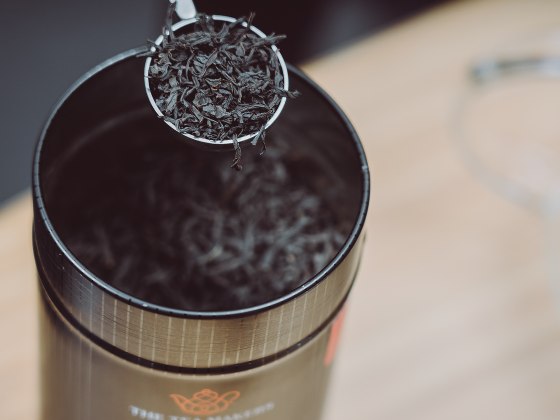

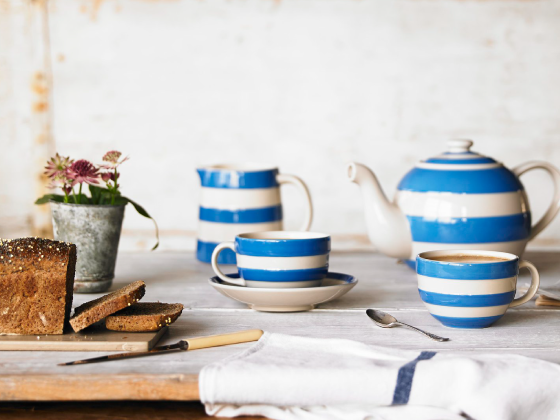
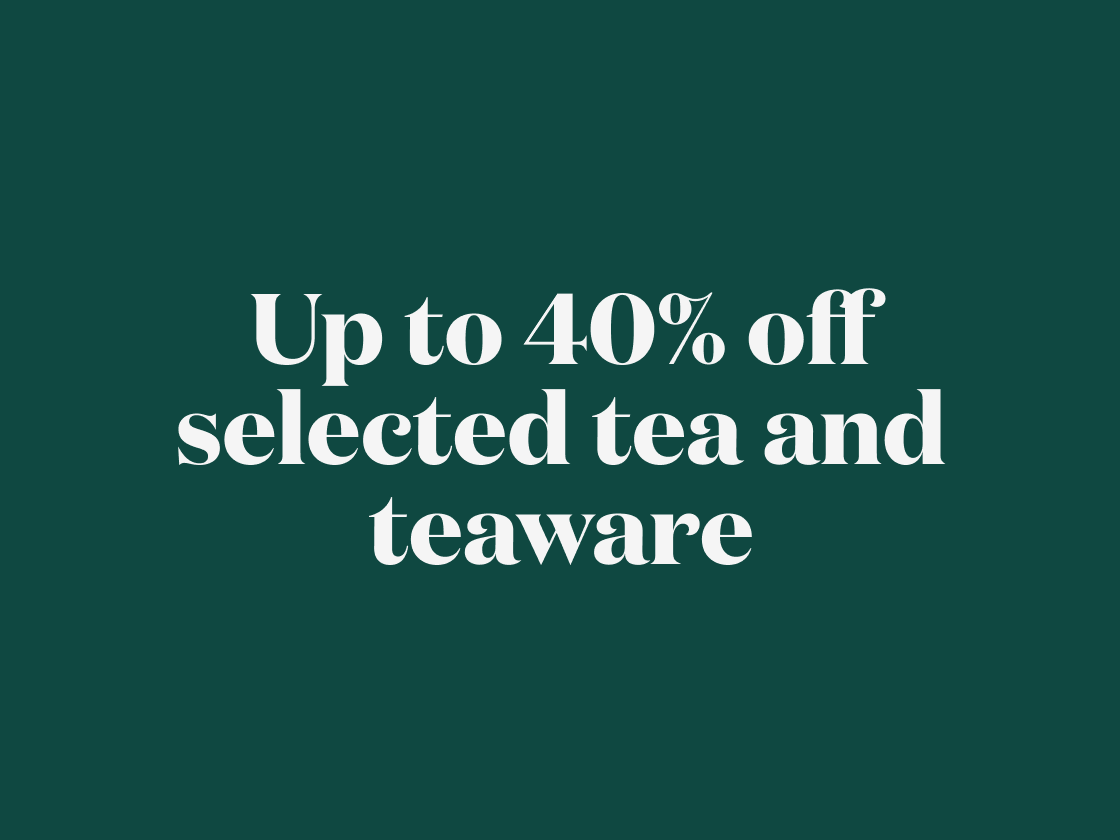




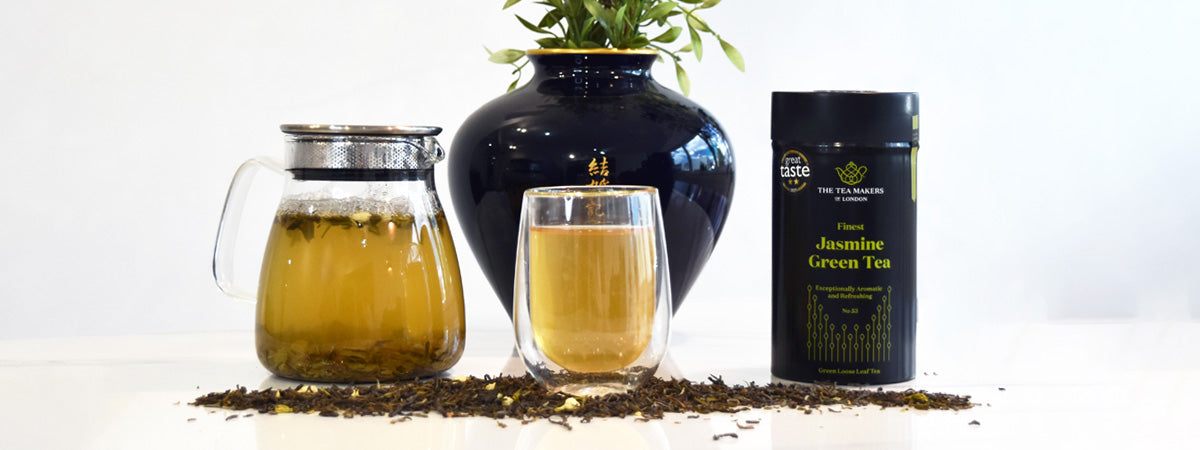

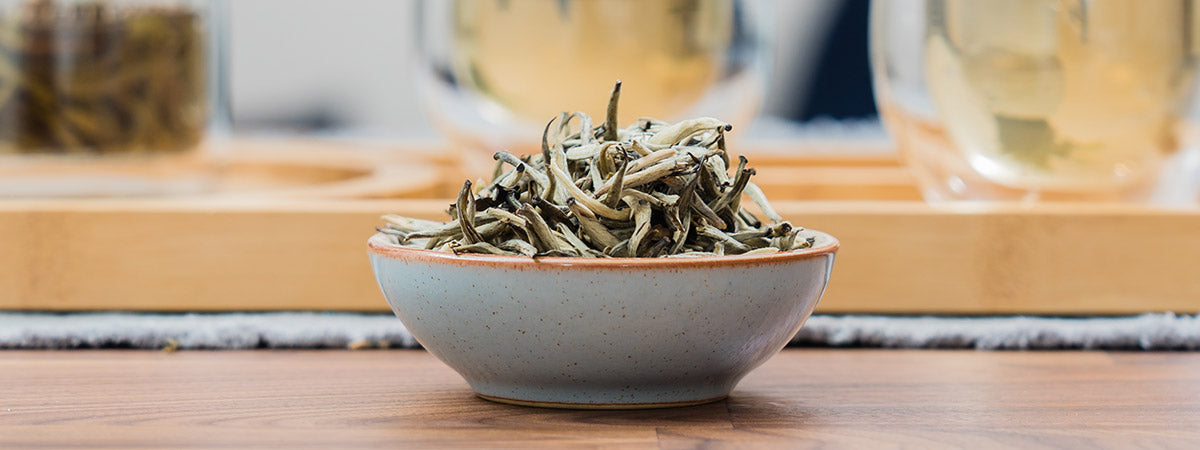
6 comments
Teresa Ryan
I love Jazmine tea, especially in afternoon and evening to relax. This website was very informative about the health benefits of Jazmine tea
I love Jazmine tea, especially in afternoon and evening to relax. This website was very informative about the health benefits of Jazmine tea
DAVID
Good too hear about the tea thank you
Good too hear about the tea thank you
Barbara Schaefer
- I have always had a hesitatn relationship with Green Tea – knowing that iwas supposed to be good for me, but not particulary liking the tast – elthough more bearble with lemon and honey – now I have found green tea with jasmin – I am won over. The combination feels outright indulgent whie not a penetrating as Earl Grey in dealing tih the taste buds.-
- I have always had a hesitatn relationship with Green Tea – knowing that iwas supposed to be good for me, but not particulary liking the tast – elthough more bearble with lemon and honey – now I have found green tea with jasmin – I am won over. The combination feels outright indulgent whie not a penetrating as Earl Grey in dealing tih the taste buds.-
Patricia Jones
Dear Teamakers – very informative coverage of green Jasmin tea – thank you. Actually I never liked the taste of the Japanese green tea, but having now tasted the combination with jasmine flowers, I can’t get enough of it!
Kind regards
Patricia Jones
Dear Teamakers – very informative coverage of green Jasmin tea – thank you. Actually I never liked the taste of the Japanese green tea, but having now tasted the combination with jasmine flowers, I can’t get enough of it!
Kind regards
Patricia Jones
Terry Buie
Would like to buy a bag of tea
Would like to buy a bag of tea
Brad
Green tea is also good for inflammatory diseases such as arthritis and gout due to THE antioxidant epigallocatechin-3-gallat (EGCG). Various stufies have shown EGCG protects joints and tissues by lowering the immune system’s production of certain molecules that might lead to inflammation and joint pain. A good article on this can be found here http://beatgout.org/is-green-tea-good-for-gout/
Green tea is also good for inflammatory diseases such as arthritis and gout due to THE antioxidant epigallocatechin-3-gallat (EGCG). Various stufies have shown EGCG protects joints and tissues by lowering the immune system’s production of certain molecules that might lead to inflammation and joint pain. A good article on this can be found here http://beatgout.org/is-green-tea-good-for-gout/